Khamenei Office In London Receives £109,000 From UK Government
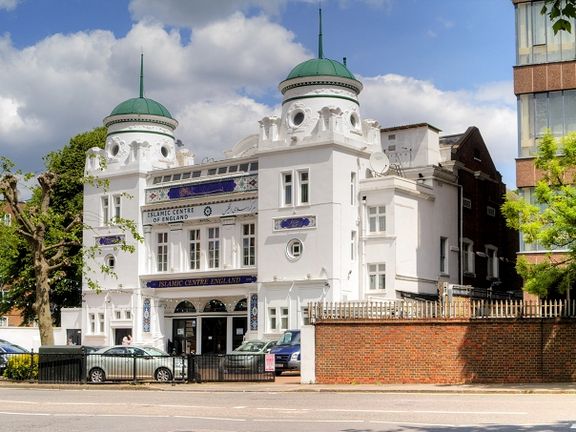
Supreme Leader Ali Khamenei’s office in London received more than £100,000 in coronavirus aid from the British government, The Times reported on Wednesday.

Supreme Leader Ali Khamenei’s office in London received more than £100,000 in coronavirus aid from the British government, The Times reported on Wednesday.
Official figures filed last month show that the Islamic Center of England received £109,476 from the coronavirus job retention scheme, a government program to protect jobs amid pandemic disruptions.
The Islamic Republic, controlled by Khamenei, does not allow the presence of many international institutions or non-governmental organizations in Iran, but it directly and indirectly has a network of associations and offices in the world, including Western countries.
The issue with Britain is starker, as Iran is detaining Iranian-British dual citizens on charges of sedition and espionage without due process of law.
Although Khamenei’s representative offices abroad are presented as his religious envoys, they in fact carry political weight and try to project influence both within Iranian and the wider Shiite Muslim communities in host countries.
Legally, the Islamic Center of England might have been eligible for the special government aid, but politically the episode can have repercussion in the United Kingdom, which democratically allows residents to form associations and establish foundations.
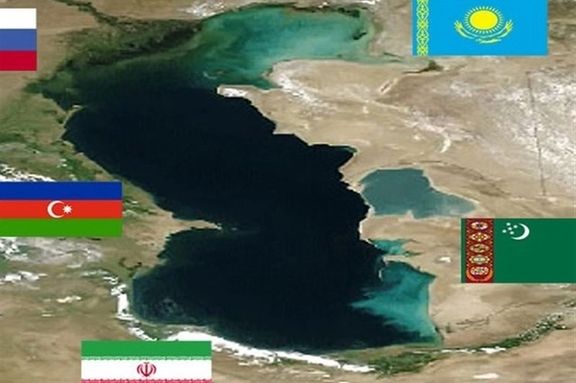
Russia’s Tehran embassy denied Wednesday there was any agreement between Iran and Russia to block Iranian gas extraction in the Caspian Sea as long as Iran’s demand for gas remains lower than its output.
A tweet from the embassy said that the claim, made by Adeshir Dadras, chairman of Iran’s Compressed Natural Gas syndicate, was untrue and that the embassy was authorized to declare it “a deliberate provocation aimed at undermining friendly Russian-Iranian relations.”
Dadras’ assertion, made in an interview with the Iranian Labour News Agency (ILNA) Monday, was also rejected Tuesday by Kazem Jalali, Iran’s ambassador in Moscow, who referred to rumors being spread by those trying to undermine Tehran’s relations with Moscow. It was refuted too by the main developer of the Chalos natural gas structure in the Caspian, Iran’s Khazar Exploration and Production Company (Kepco).
In June when announcing that development of Chaloushad been approved, Emad Hosseini, Kepco chairman, said the field held 30 percent of developable natural gas reserves of all Caspian Sea littoral countries and could, following $19 billion in investment and the lifting of United States sanctions, meet at least 20 percent of Europe's natural gas needs.
The claim gave rise to much criticism of relations with Russia from Iranian social media users who accused the government of political and economic concessions to Russia.
In August, an article by Simon Watkins for OilPrice.com, an energy news website, claimed that the size, price, and destination of this gas would be coordinated with Russia to boost "the energy power that Moscow has over Europe."
Watkins claimed Iran had agreed to “de facto control over where and at what price the vast majority of Iran’s gas is sold" as part of discussions over a 20-year cooperation agreement with Russia, similar to the 25-year pact signed with China in March.
The agreement, Watkins suggested, would enable Russia to head off any potential challenge to its own place in the European market – and presumably keep up gas prices to both Russia’s and Iran’s benefit – posed by a new supply of Iranian gas once US sanctions ended.
"Controlling this potential threat to its own dominance over gas supplies into Europe – and the considerable geopolitical power over the continent that comes with this – has been a major concern of Moscow’s for many years," Watkins wrote.
With 17.9 percent, Iran has the second-largest global gas reserves after Russia, which holds 18.1 percent. According to OilPrice, the wider Caspian basin area, including onshore and offshore fields, is conservatively estimated to have in proven and probable reserves around 48 billion barrels of oil, around 3 percent of world reserves, and 292 trillion cubic feet of natural gas, around 4 percent of the global total.
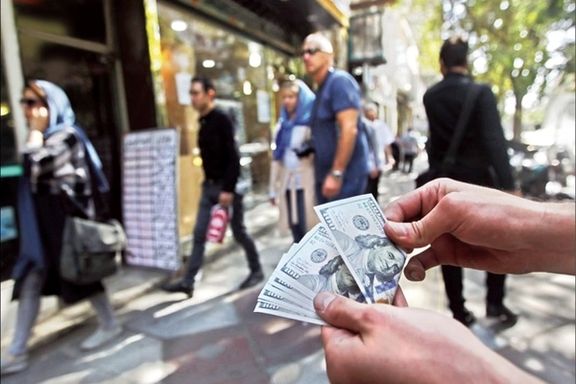
The IMF in a recent report showed that Iran’s foreign currency reserves increased from a low of $12.4 billion in 2020 to a projected $31.4 billion for 2021.
The October 2021 Regional Economic Outlook: Middle East and Central Asia report of the International Monetary Fund contains a table of countries with their foreign reserves listed since 2000. Iran’s foreign reserves in 2018 was $122.5 billion and in 2020 had dropped to $12.4 billion.
When the United States withdrew from the 2015 nuclear agreement known as the JCPOA in May 2018 and began restricting Iran’s oil exports and international banking relations, the Islamic Republic dipped into its foreign reserves to make up for the loss of oil revenues.
In its more than 40-year history, the Islamic government has remained heavily dependent on oil exports to finance at least half of its known government budget, plus its secret military, intelligence and regional alliances.
The ‘maximum pressure’ campaign launched by the Trump administration gradually reduced Iran’s oil exports and kept them at a historically low level of around an average of 200,000 barrels a day from May 2019 to late 2020. Before the sanctions, Iran exported were more than 2 million barrels a day.
In September 2020, candidate Joe Biden announced that he opposed Trump’s decision to leave the JCPOA and wanted to return to the deal if elected. This meant that he had to lift at least some of the sanctions. Reports came a while later that Iran’s oil shipments had increased to 500,000 bpd or more.
It is difficult to say with certainty that the additional oil sales have boosted Iran’s currency reserves from 12 to 31 billion dollars in one year, but they must have helped.
In April as negotiations to restore the JCPOA started in Vienna, Reuters reported that Iran was selling around 500,000 bpd, much less than before the sanctions but enough to generate at least $9 billion annually. We can never be certain of exactly how much oil Iran is exporting clandestinely and how much money it is making. Perhaps it is more than $9 billion, as some estimated that exports had reached 900,000 bpd in some months. China is the main importer, although officially its customs data show no oil imports from Iran.
Critics say that the Biden administration is not rigorously enforcing US sanctions and has allowed China to buy Iranian oil, disguised as shipments from other countries, pretending not to know the real origin of cargoes it receives.
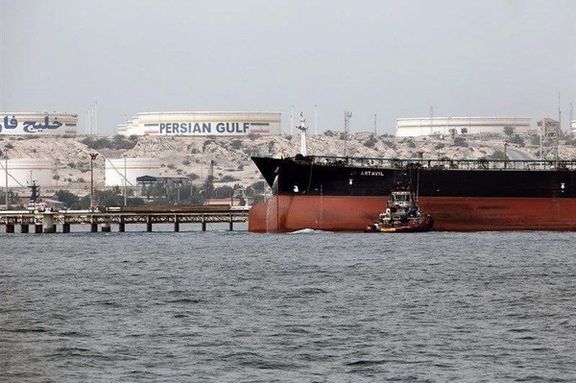
Gabriel Noronha, former Special Advisor for the Secretary's Iran Action Group at the State Department during Trump told Iran International that “For months, the Biden Administration has seen and ignored Iranian oil sales to China, which has now provided Iran around $10 billion in additional revenue. The most it has done is threaten sanctions against China, but shown no willingness to actually do so. They mistakenly believe that China's cooperation is needed to get back into the JCPOA, when it is really a question for Iran to answer. It is very disappointing that this administration has taken such a naive approach to China's relationship with Iran.”
Iranian experts have argued that China is paying little cash for the oil it buys from Tehran due to US banking sanctions, and instead it sends goods via middlemen, who make huge profits. But the mystery of the IMF estimate remains in place. Without oil revenues, Tehran could not have boosted its reserves.
Fars news agency affiliated with the Revolutionary Guard insisted in October that China is buying oil from Iran,
Noronha blames the Biden Administration for not fully enforcing US sanctions. Iran has left the JCPOA multilateral talks in Vienna since June and has not committed to a date for resuming negotiations. Meanwhile, it is enriching uranium to up to 60 percent purity that has no civilian use.
“Instead of getting a better deal or depriving the regime of funds for its nuclear program and terrorism, the Biden Administration has obtained zero concessions from the regime in its 10 months of appeasement,” Noronha says.

An influential conservative lawmaker in Iran criticized Tuesday what he alleged was excessive influence of the son-in-law of President Ebrahim Raisi (Raeesi).
In a speech on the floor of parliament, Mahmoud Ahmadi-Bighash, who served as the governor of Khorasan Province in former President Mahmoud Ahmadinejad's administration, suggested that "all happenings and appointments" in the government needed approval from by Meghdad Nili, the president’s "beloved and precious" son-in-law.
Ahmadi-Bighash, who is a member of the Iranian parliament's National Security and Foreign Policy Committee, charged that top governments appointments were based on the “costly occurrence” of "excessive reliance on a closed circle of Imam Sadegh University alumni,” including executive appointments that “wiped out the influence of minister or ministers.”
Nili is an alumnus of Imam Sadegh as well as the founder of Raja News website, which is headed by his brother Meysam Nili. The website is close to the Paydari Front, a conservative group calling itself ‘revolutionary’, led by Sadegh Mahsouli, an interior minister during the presidency of Mahmoud Ahmadinejad (2005-13).
The harsh criticism of Raisi is unprecedented in a parliament dominated by conservatives and hardliners who are from the same political persuasion as the president and backed his candidacy during the June campaign.
After backing Raisi in June’s presidential elections, the Paydari Front was disappointed when Raisi nominated as interior minister Esmail Khatib rather than a member of the front.
Ahmadi-Bighash, who was governor of Khorasan province when Ahmadinejad was president, also slammed Raisi’s provincial visits to various parts of the country, which he said lacked planning and goals.
"Your direct engagement with people to find out about problems is the worst calamity,” he said. “Doesn't the government know where the problems lie and where it is standing itself so that it has to ask people what their problems are?” It was obvious to all, Ahmadi-Bighash opined, that such problems arose from "poisonous management, executive and supervisory bodies."
The parliamentarian also attacked the president for gaffes and errors in public speeches and interviews. "Is there such a scarcity of academics and politicians in the country that there aren't any prominent university professors in the president's office to write a few words for you to read at official occasions?” he asked. “To prevent you from making so much feeble, controversial, unscientific and unfounded statements?"
Reformist media has recently made Raisi the butt of jokes, as it once did Ahmadinejad, for supposedly lacking refinement or education. Etemad newspaper in a commentary recently claimed blunders would destroy Raisi’s self-confidence.
Ahmadi-Bighash applied the term "deldadegan" (‘smitten by love’) to Raisi's administration, evoking a rhyme with “delvapasan” (‘the concerned’), a word reformists widely used during Hassan Rouhani's presidency to describe those opposing Iran’s 2015 nuclear deal with world powers.
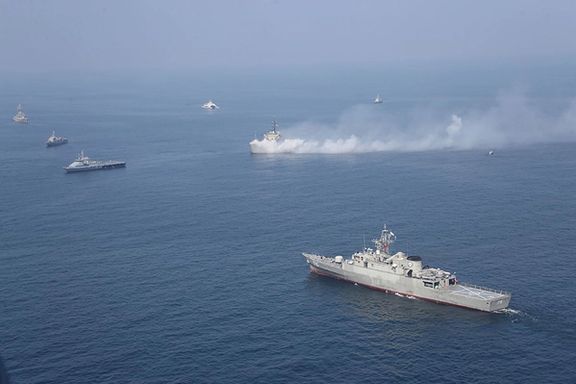
Iran claimed Wednesday that “recently” the United States tried to seize Iranian oil in the Sea of Oman, but the IRGC Navy intervened and repossessed the oil.
The vague report first by state media, was followed by a Revolutionary Guard statement repeating the media report with little details added, such as which vessels were involved.
The report said that the US Navy stopped a tanker carrying Iranian oil and transferred the cargo to another vessel. However, The Revolutionary Guard using helicopter landing seized that tanker and brought it back to Iranian territorial waters.
"With the timely and authoritative action of the Guards naval forces, the US terrorist Navy's operation to steal Iranian oil in the Sea of Oman failed," Iran's Guards said.
The IRGC said the incident took place on October 25.
Reuters reported that US officials speaking on condition of anonymity said that the Iranian report was not true and there had been no US attempt to seize a tanker.
The American officials said that in reality Iranian forces had seized a Vietnamese-flagged oil tanker last month and US naval forces were just monitoring the situation.
The report further claimed that the US Navy tried to intervene and stop the movement of the vessel by using helicopters and warships but “with the decisive intervention of IRGC” forces were unable to block the tanker’s route.
The United States or regional countries have not reported any incident recently.
The latest maritime incident dates to August 3, when Reuters quoted three “maritime security forces” as saying “Iranian-backed forces” had seized a tanker off the coast of UAE. The vessel was identified as the Panama-registered Asphalt Princess. One day later, the United Kingdom Maritime Trade Operations (UKMTO), the Royal Navy information service for shipping, reported that a potential hijack incident off the coast of the United Arab Emirates was “complete,” suggesting boarders had left the tanker.
The Iranian foreign ministry spokesman Saeed Khatibzadeh, at the time said Iran was “ready to deliver help and to provide a close investigation of the matter.” He implied that recent incidents with shipping in the Gulf of Oman and the Persian Gulf were “very suspicious.” Iran's senior armed forces spokesman, Abolfazl Shekarchi on the same day the incident was reported criticized "a kind of psychological warfare…setting the stage for new bouts of adventurism.”
The IRGC said video evidence of the alleged incident will be issued as the nature of the incident remains shrouded in mystery.
Iran has been shipping oil to Asian destinations despite US sanctions. China has increased its crude imports from Iran, although the cargoes are not officially registered as having originated in Iran.
The Trump administration seized a large shipment of Iranian fuel to Venezuela in August 2020, saying that the cargo belonged to the IRGC, a designated terrorist organization. The fuel was later sold on the open market.
Tensions are high in the region as nuclear negotiations with Iran are at an impasse, with Tehran having so far not returned to multilateral talks in Vienna suspended since June.
The US flew a B-1B bomber over the Middle East on Saturday, which was the first flyover since the Trump administration sent B-52 bombers several times into the region.
Allied fighter planes, including from Israel, escorted the B-1B bomber. Biden sending a B1-B bomber into the region allows him to send "a clear message of reassurance" to regional allies, the US Air Force's Central Command said in a Twitter post.
Updated at 19:09 GMT
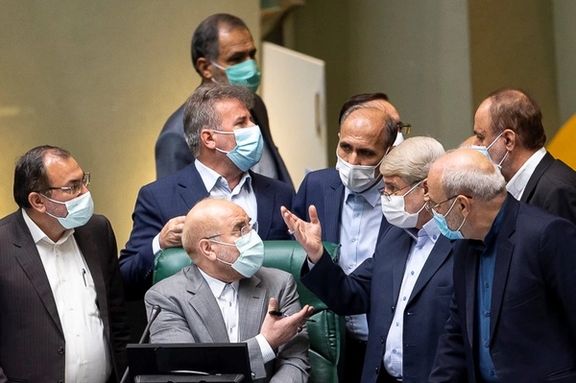
A comment on the proposed bill to restrict Internet access in Iran by a leading lawmaker has revealed deep differences among conservatives over the legislation.
Iranian Labour News Agency, ILNA, on Tuesday quoted Reza Mir-Tajeddini, a conservative member of Iran’s parliament as saying, "Not only the Majles is not after restricting Internet access, but even the ban on social media platform Twitter should be lifted as revolutionaries can spread our message in the world using the platform."
The comment by Mir Tajeddini was in sharp contrast to remarks by the staunchest opponent of social media at the Iranian parliament Morteza Agha-Tehrani who happens to be the former leader of ultraconservative Paydari Party holding the majority at the conservative-dominated parliament.
Agha Tehrani said last week that over 20,000 Iranians have cursed him for his opposition to social media, adding that he would try to further the legislation and have foreign social media banned even if 80 million Iranians oppose him.
Mir-Tajeddini, on the other hand, said on Tuesday, "Why should Twitter be banned in Iran when the country's officials are using it? If it is bad, it should be banned for everyone, but now that the officials are using it, everyone else should also have access to the platform."
Mir-Tajeddini was alluding to the fact that Supreme Leader Ali Khamenei has several Twitter accounts in various languages, and other civilian officials and military commanders including President Ebrahim Raisi, Judiciary Chief Ghiolamhossein Ejei, Majles Speaker Mohammad Bagher Ghalibaf and national security chief Ali Shamkhani also use Twitter and other social media platforms for their messaging.
Mir-Tajeddini further stressed at the bans on other social media platforms should also be lifted. He said different ideas are being put forward on social media and there are so many insightful cultural figures in Iran who can remove possible doubts and answer possible questions. Facebook and You Tube are also blocked in Iran
Hardliners in Iran including Khamenei have spoken against free access to social media and have said that they should be regulated.
Iran during the past years has banned all major social media apps in Iran except Instagram where some 22 million Iranians are reportedly active. More than twice as much Iranian accounts are active on Telegram where sending video, audio and text is much easier. Telegram is also blocked but people use VPNs to connect.
Following the bans on most social media platforms after 2017, the Iranian government spent hefty budgets to develop its own homegrown applications. But Iranians did not trust government-made apps fearing surveillance and invasion of their privacy by security agencies.
On the other hand, homegrown applications have proven to be ineffective as they cannot support more than a few thousand users at any given time. Furthermore, they cannot facilitate cultural and scientific exchanges with the outside world.
The bigger concern on the part of more open-minded conservatives such as Mr. Mir-Tajeddini is that by restricting access to popular social media platforms such as Twitter, Telegram, Instagram and Facebook, Iranians are not likely to turn to Iran's own heavily restricted television and other media outlets that have been losing their audiences to foreign-based satellite television. This group of conservatives are probably concerned that in the absence of social media, the shaping of public opinion in Iran will fall totally into the hands of foreign-based satellite television channels whose sharp disagreement with the party-line in Iran is more than obvious and Iran's state-run TV cannot compete with those networks in terms of uncensored news and quality entertainment.